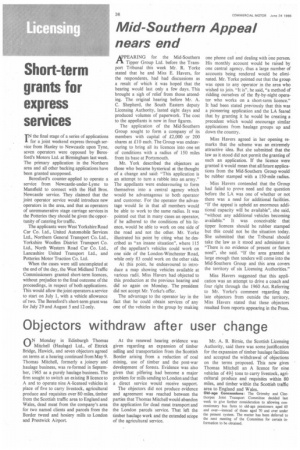Mid-Southern Appeal nears end
Page 38

If you've noticed an error in this article please click here to report it so we can fix it.
APPEARING for the Mid-Southern /1. Tipper Group Ltd. before the Transport Tribunal this week Mr. R. Yorke stated that he and Miss E. Havers, for the respondents, had had discussions as a result of which it was hoped that the hearing would last only a few days. This brought a sigh of relief from those attending. The original hearing before Mr. A. C. Shepherd, the South Eastern deputy Licensing Authority, lasted eight days and produced volumes of paperwork. The cost to the appellants is now in four figures.
The application of the Mid-Southern Group sought to form a company of its members with capital of £2,000 or 200 shares at f 1 0 each. The Group was endeavouring to bring all its licences into one set of conditions with a radius of 150 miles from its base at Portsmouth.
Mr. York described the objectors as those who became hysterical at the thought of a change and said: "This application is an attempt to turn a rabble into an army." The appellants were endeavouring to form themselves into a central agency which would be advantageous to both operator and customer. For the operator the advantage would lie in that all members would be able to work to the same radius. It was pointed out that in many cases an operator, if he adhered to the conditions of his licence, would be able to work on one side of the road and not the other. Mr. Yorke illustrated his point by citing what he described as "an insane situation", where 115 of the appellant's vehicles could work on one side of the London-Winchester Road, while only 83 could work on the other side.
At this point, he endeavoured to introduce a map showing vehicles available at various radii. Miss Havers had objected to this production at the previous hearing and did so again on Monday. The president did not accept Mr. Yorke's offer.
The advantage to the operator lay in the fact that he could obtain services of any one of the vehicles in the group by making one phone call and dealing with one person. His monthly account would be raised by one central agency, thus a large number of accounts being rendered would be eliminated. Mr. Yorke pointed out that the group was open to any operator in the area who wished to join. "It is", he said, "a method of ridding ourselves of the fly-by-night operator who works on a short-term licence." It had been stated previously that this was a pioneering application and the LA feared that by granting it he would be creating a precedent which would encourage similar applications from haulage groups up and down the country.
Miss Havers agreed in her opening remarks that the scheme was an extremely attractive idea. But she submitted that the law as it stood did not permit the granting of such an application. If the licence were granted it would mean that all future applications from the Mid-Southern Group would be rubber stamped with a 150-mile radius.
Miss Havers contended that the Group had failed to prove need and the question before the LA was one of whether or not there was a need for additional facilities. "If the appeal is upheld an enormous additional capacity will be available", she said, "without any additional vehicles becoming available." It was conceivable that tipper licences should be rubber stamped but this could not be the situation today. She submitted that the Tribunal should take the law as it stood and administer it. "There is no evidence of present or future need", she said. "If the area granted is large enough then tenders will come into the Mid-Southern Group and this area covers the territory of six Licensing Authorities."
Miss Havers suggested that this application was an attempt to drive a coach and four right through the 1960 Act. Referring to Mr. Yorke's comment regarding the late objectors from outside the territory, Miss Havers stated that these objectors resulted from reports appearing in the Press.
























































































































